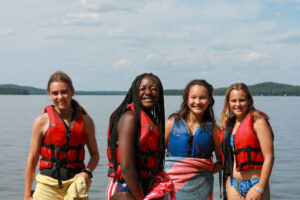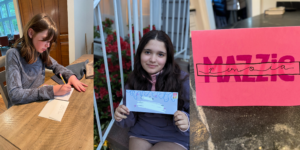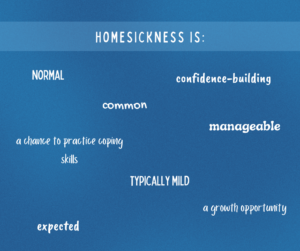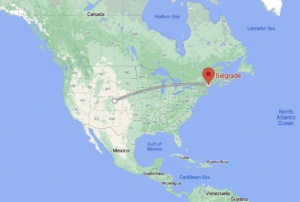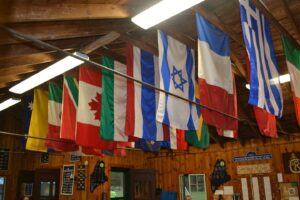- The Power of Friendship at Camp
- Camp Runoia’s Unique Environment for Building Friendships
- Empowering Girls Through Decision-Making
- Structure of Camp Runoia: Encouraging Group Cohesion
- Positive Influences at Camp Runoia
- Lasting Friendships and Personal Growth Beyond Camp
If you’ve ever gone to a sleepaway summer camp as a kid, you probably remember nights spent around the fire singing songs followed by late night laughs in the cabin with your new friends. For many, summer camp provides a unique environment for girls to make lasting friendships while also fostering personal growth. At Camp Runoia, an all girls summer camp in Maine, we understand the importance of making friends at summer camp and strive to create an empowering and supportive environment for girls to develop lifelong skills and lifelong friendships!
The Power of Friendship at Camp
The friendships we make in our younger years are often the ones that matter the most. Cultivating healthy relationships is extremely valuable for growing girls as they provide emotional support, social development, and build confidence. At Camp Runoia, we create a safe environment for building connections and summer camp friendships. Camp is a place where girls can bond, feel accepted, and open up without judgment. Girls come to Runoia to enjoy experiences with a diverse group of friends with a variety of backgrounds supported by caring counselors.
Camp Runoia’s Unique Environment for Building Friendships
The all girls environment at Camp Runoia encourages collaboration, trust, and mutual support among campers. The many shared activities such as group hiking trips, cabin life by the lake in Maine, and team-building exercises naturally form bonds between campers, creating memories that will last a lifetime. We have a powerful group of staff who are committed to guiding campers through social dynamics and empowering them by modeling positive relationship-building. Sometimes, the healthy bonds made between staff and campers are the relationships that have the largest impact on the girls here at camp.
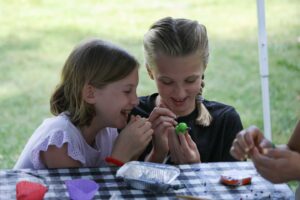
Empowering Girls Through Decision-Making
At Camp Runoia, we understand that making decisions can be challenging, especially for young girls. That’s why we create a supportive environment where campers can grow by making choices for themselves and taking responsibility. From selecting their own activities to engaging with different groups during free time, campers develop confidence, communication skills, and independence—valuable life skills that extend far beyond the summer camp experience. Taking initiative in decision-making also helps girls connect with like-minded peers, fostering deeper and more meaningful friendships.
Our campers design their own schedules in three-day cycles, selecting four activity periods per day. After three days, they choose a new schedule, allowing them to explore different interests each week. Over the course of a traditional three-week session, campers experience five unique activity blocks and have the opportunity to participate in at least one optional wilderness trip. This progressive program encourages skill development, level advancement, and achievement in activities of their choosing, empowering each camper to excel at their own pace.
We take great pride in being a community that empowers girls to advocate for themselves, use their voices, and become agents of change in the world. Through the freedom to make choices and take ownership of their camp experience, girls learn the importance of self-expression, leadership, and standing up for what they believe in.
Structure of Camp Runoia: Encouraging Group Cohesion
Making friends at summer camp can feel overwhelming at first, but the supportive structure and welcoming environment of Camp Runoia make it easy to feel at home. From close-knit cabin groups to outdoor adventures and team-based activities, campers have countless opportunities to form meaningful friendships with the guidance of our dedicated staff. Tackling challenges together—whether it’s hiking a tough trail or completing a group scavenger hunt—fosters strong connections and creates unforgettable bonding moments.
With over 30 summer camp activities to choose from in an all-girls setting, campers can explore their interests and meet others who share their passions, free from outside distractions. Campers live in traditional cabins with peers of the same age or grade, while activity choices are based on individual interests and selected daily. Mealtimes bring the community together at mixed-age tables, thoughtfully arranged by our director team, who take the time to know each camper personally. In the evenings, the entire camp comes together for group activities, ensuring that every camper feels included, engaged, and part of the Runoia family.
Positive Influences at Camp Runoia
Having positive influences and role models is extremely important in a girl’s emotional development. Our staff members serve as excellent role models for our campers, and even older campers can step into this role by mentoring younger girls through our counselor-in-training program. The various activities at Camp Runoia emphasize teamwork, listening, and respecting others’ ideas, which build empathy and communication skills. All-camp activities, performances or creative expression gives girls the opportunity to assert themselves and encourage confidence and self-worth, all while making genuine camp friendships.
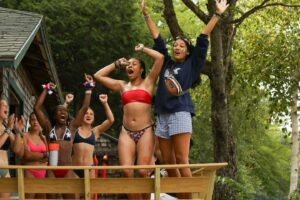
Lasting Friendships and Personal Growth Beyond Camp
Friendships made at Camp Runoia often extend well beyond the summer, with many girls maintaining lifelong bonds with girls from different corners of the U.S. and other parts of the world. These friendships encourage personal growth for girls in many aspects- emotionally, socially, and mentally. Summer camp friendships and the skills learned at camp set the foundation for future success for campers in all aspects of their lives. Our all girls’ sleepaway camp tucked away in the woods in Maine continues to build stronger bonds and deeper friendships year after year amongst campers, staff and the overall community.
____________________________________________________________________________
Camp Runoia’s unique structure and values create an empowering environment where girls can forge lasting friendships and experience meaningful personal growth. By fostering collaboration, trust, and decision-making opportunities, campers not only build strong connections with one another but also develop the confidence and social skills that will serve them long after the summer ends. With a supportive all-girls summer camp atmosphere, dedicated staff, and a variety of activities designed to challenge and inspire, Camp Runoia is the perfect place for girls to grow, learn, and thrive together.
If you’re looking for a transformative summer camp experience, we invite you to explore more about Camp Runoia and join us for the next session at one of the best girls’ camps in the Northeast. Whether you’re seeking a girls’ camp in Maine or an all-girls summer camp near you, Camp Runoia offers the ideal setting for friendships that last a lifetime and the personal growth that every girl deserves.
